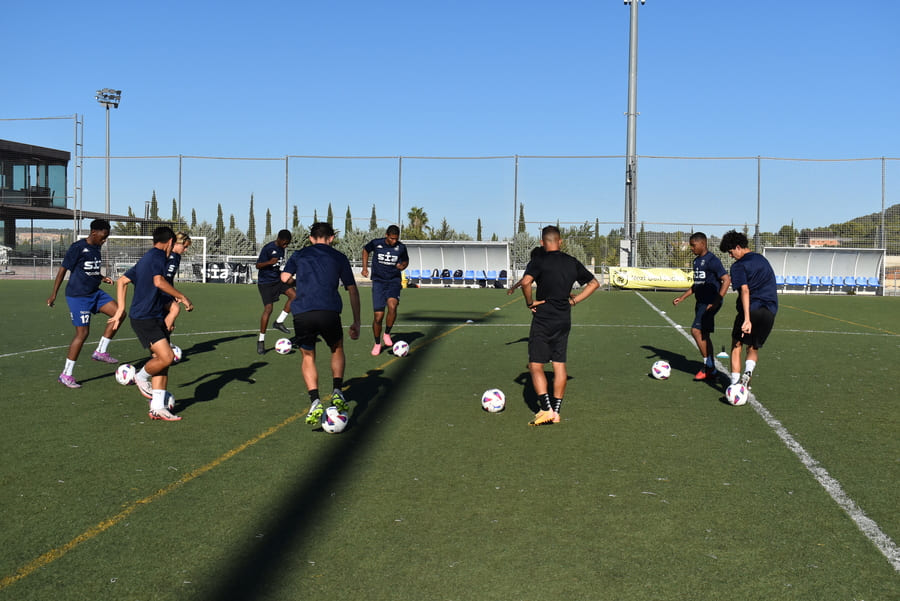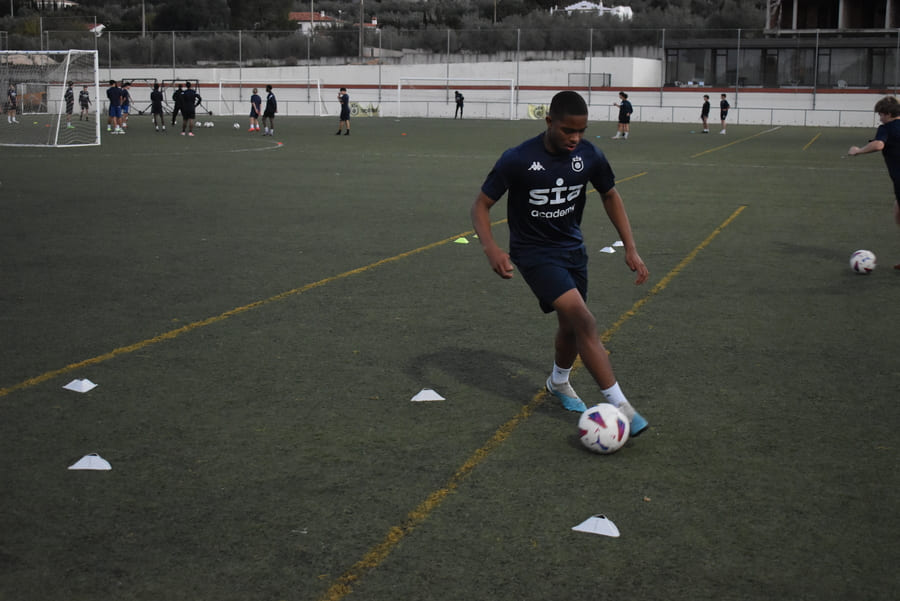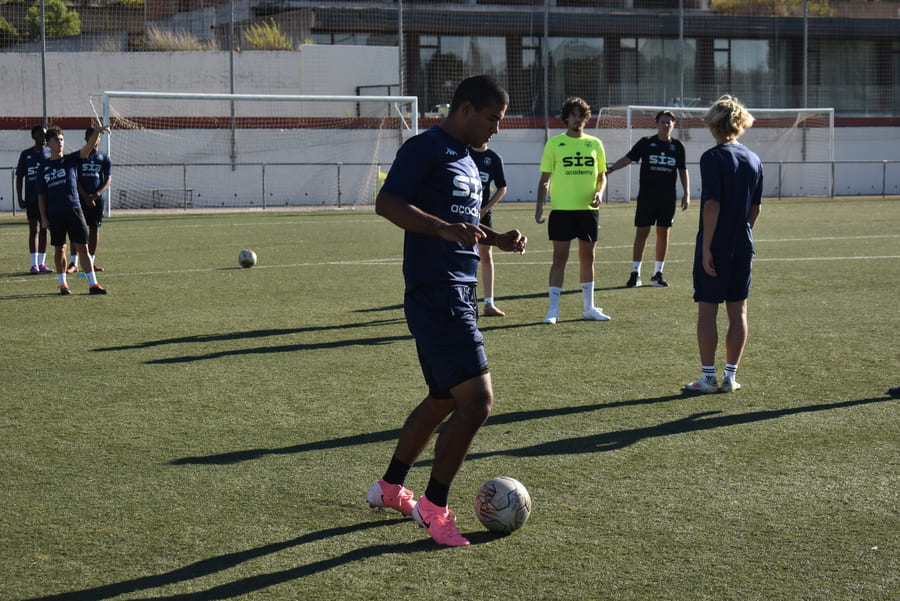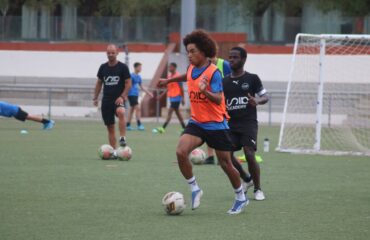Competing at the highest level in football means facing moments of tension, expectation, and emotional intensity. Pressure is inevitable — it’s part of the game. What separates a good player from a great one is not only technique or fitness but the ability to stay calm, focused on strategies, and confident when everything is on the line.
Modern football demands psychological preparation equal to physical training. The ability to manage emotions, concentrate, and maintain composure during crucial moments can define entire careers. From penalty shootouts to decisive matches, the mind plays as big a role as the feet.
At SIA Academy, we work every day to strengthen that mental side of the game. Our players learn that competing under pressure is not about avoiding fear but learning to use it as fuel. As José Luis, our sports psychologist, says:
“The key is not to eliminate pressure — it’s to recognize it, understand it, and turn it into performance.”
Below are the seven most effective psychological strategies to compete successfully under pressure, based on professional practice, research, and our own daily experience at SIA Academy.
Table of contents
1. Focus on what you can control
Under pressure, the brain tends to amplify uncertainty. Players worry about the crowd, the scoreboard, or the opponent’s reputation — things they can’t influence. The first step is to redirect attention to controllable factors: effort, positioning, breathing, and mindset.
Training mental focus means breaking down the game into manageable parts. When athletes concentrate on the next pass instead of the final result, they stay present and perform better.
2. Develop a consistent pre-performance routine
Consistency breeds confidence. Creating a personal ritual before each match —listening to the same song, doing breathing exercises, or visualizing early passes— helps the brain associate that pattern with readiness.
At SIA Academy, we teach players how to design their own routines. Through repetition, these actions become anchors that help them stay composed in any environment, whether it’s a friendly match or a final.
As José Luis explains: “A routine is like a mental map. It guides the player toward focus, even when the situation feels chaotic.”

3. The strategies of trains under simulated pressure
No amount of theory can replace experience. That’s why one of the most powerful methods is to train with realistic pressure. We reproduce competitive conditions —crowd noise, time constraints, penalty scenarios— to prepare players emotionally and mentally.
When the body and mind become accustomed to stress, real competition feels familiar instead of overwhelming. This principle is at the heart of what we do at SIA Academy: helping athletes build resilience through experience.
4. Use controlled breathing to regulate emotions
Breathing is one of the simplest and most effective tools for managing anxiety. Deep, rhythmic breathing activates the parasympathetic nervous system, slowing the heart rate and reducing tension.
Before a key penalty, after a defensive mistake, or during a break in play, a few conscious breaths can reset the body and mind. We train this skill systematically, combining it with mindfulness sessions to help players recover focus in seconds.
5. Reframe pressure as opportunity
Many athletes perceive pressure as a threat — something that could expose their weaknesses. The most successful ones, however, see it as a challenge. This shift in mindset changes the body’s response: instead of fear, they feel readiness and energy.
At SIA Academy, we help our players reinterpret pressure as proof of their growth. Competing under stress is a privilege — it means being in a position that matters. When players embrace that idea, they play with freedom instead of fear.

6. Build emotional awareness and acceptance
Emotional control doesn’t mean suppression. Denying nerves or frustration only amplifies them. The goal is to recognize emotions, label them, and respond consciously.
Through guided sessions, we teach players to identify emotional triggers: mistakes, referees, or teammates’ reactions. Once they become aware of what activates their stress, they can use strategies —like breathing or focus shifts— to regain control.
In my work at SIA Academy, I often see players transform once they learn that emotions are not enemies but information. Understanding them allows performance to flow naturally.
7. Strengthen identity beyond performance
Perhaps the most overlooked aspect of psychological training is self-worth. Players who tie their identity solely to results suffer more when facing adversity. Separating who they are from what they achieve builds emotional stability.
We encourage our athletes to develop interests outside the pitch —study, hobbies, relationships— to keep a healthy balance. This broader perspective helps them recover faster from mistakes and setbacks.
When the mind is at peace, the body follows. Football becomes an expression of who they are, not a judgment of their value.
Integrating psychology into daily training
At SIA Academy, we believe that mental training is not an accessory — it’s an essential part of development. Every session includes moments of reflection, feedback, and emotional management. Players learn to analyze what they felt during a drill, not just what they did.
We work closely with José Luis to ensure that psychological growth runs parallel to tactical and physical progress. Our aim is clear: to create footballers capable of making calm decisions in chaos.
Competing under pressure is no longer a matter of chance. It’s a skill that can be trained, measured, and improved. By combining neuroscience, sports psychology, and experience, we turn stress into focus and fear into energy.
In football, pressure doesn’t disappear — it evolves. The difference lies in how each player interprets it. The seven strategies above are not abstract theories; they are daily practices that shape resilient, confident athletes.
At SIA Academy, we see it every day: players who once felt overwhelmed by big moments now use pressure to perform at their best. The mind, properly trained, becomes their greatest ally.
As José Luis often reminds our players:
“Pressure will always be there. The question is whether you let it crush you or let it push you forward.”






